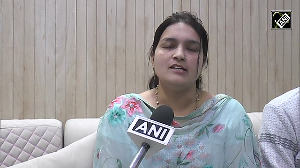The disabled would not have to pay extra while travelling by air for facilities like wheelchair or ambulift after a new rule from the Directorate General of Civil Aviation becomes effective.
The DGCA has drafted an amendment to the rules saying "once a passenger has bought a ticket for travel, it is obligatory on part of the airline that he (or she) reaches the aircraft from the departure lounge and at the end of journey from the aircraft to the arrival lounge exit, without incurring any further expenditure."
Once approved, this provision would form part of the DGCA's detailed Civil Aviation Requirement for carriage by air of the disabled, which has been effective since May last year. The DGCA has sought comments from airlines and airport operators on the draft rule and is likely to finalise it by next month, official sources said.
Under the CAR, the airlines and airport operators have been directed to ensure the presence of wheelchairs, stretchers and ambulifts to enable passengers with special needs boarding or de-boarding an aircraft. They have also been directed to train and sensitise their staff to meet the special needs of the disabled.
As the rules for disabled persons are being made more stringent, the Delhi International Airport Limited said on Friday it has already created a dedicated counter for passengers with special needs, including unaccompanied children or the aged at the IGI Airport's international terminal; a similar one was coming up at the new domestic departure terminal as well.
The counter, called Contact Zone, would provide facilities for passengers with special needs, including wheelchair assistance for physically challenged passengers and assistance for unaccompanied minors.
Currently, the facilitation for such passengers is coordinated directly by the airlines concerned. However, as those accompanying the passengers are not allowed inside the terminal, passengers with special needs often face difficulty at the drop-off areas. The Contact Zone aims at bridging this gap by facilitating the coordination between the airlines and the traveller, a DIAL spokesperson said.







 © 2025
© 2025